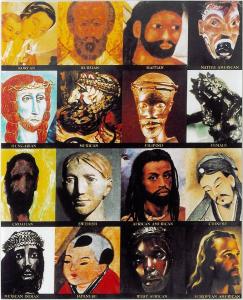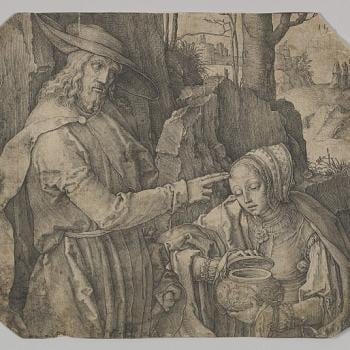Today I stumbled upon a meme today quoting the Congregational minister Robin R. Meyers
“Consider this remarkable fact: In the Sermon on the Mount, there is not a single word about what to believe, only words about what to do and how to be. by the time the Nicene creed is written, only three centuries later, there is not a single word in it about what to do and how to be – only words about what to believe.”
I posted it on my Facebook page, and it generated a fair amount of comment, much praise, some condemnation, and surprising for Facebook, some nuance.
In the comments that followed I found myself responding from what I’ve been thinking about Jesus and what we can know about him and what he was about…
Apparently the scholarly consensus is that Jesus lived, he was at one time a follower of an apocalyptic prophet named John, he said things that captured hearts, and he died horribly at the hands of the occupying Romans.
Everything after that, as they say, is seen through a glass darkly. The texts are garbled and incomplete. He wrote nothing. Nothing about him was written close to his lifetime. What ended up being written was in a language he almost certainly didn’t speak. And yes, there are counter arguments to all this. What we get is uncertain. Nothing is sure.
But there are some shadows that can be read. If humbly. If without certainty.
As I read the texts, it seems that he presented himself as a prophet, and like his teacher John, an apocalyptic. He saw a dying world, and something new being born.
Most of Jesus’ collected sayings are assertions. He spoke with the authority of the father. His message mostly appeared as calling us to a kingdom that was partially in the future and partially in the present. It all seemed to turn on a radical hospitality, favoring the poor, while warning oppressors of several sorts of the dire consequences of ignoring the least among them (appearing to really annoy the Romans as well as the established religious authorities, who by coincidence served at Rome’s pleasure).
Big emphasis in his teaching on how one acts. Not in the sense of observing purity codes and cultural boundaries, but in helping each other, caring for others as one would be cared for. It is worth noting that the community that was led by his brother after Jesus’ death seemed to hold their worldly goods in common.
I notice that in addition to the hypothetical Q which was believed to be a collection, or more likely collections of his sayings, (the gospel attributed to Thomas maybe being a long marinated version) there was a hypothetical companion collection, recounting his miracles. These two oral traditions being the source of the Synoptic gospels. If one is looking for evidence of the truth of his statements, I guess his earliest admirers went for the miracles.
With the sacking of Jerusalem, and the dispersal of his family and immediate followers, the keeping of his teachings fell to the hands of nonJewish admirers. The eventual majority of them followers of Paul would become the normative church.
The gospel attributed to John from this later period, probably not by direct followers of Paul, but incorporated into that growing gentile community was based in a long reflection on his teachings, with some ugly bits from the separation of his followers out of the Jewish community marring a rather compelling summation blending the prophet into a Greek mystery.
Tying it all together in a mystery called love, some dream of radical interdependence, and how we live with one another as if we all count as the children of God.
No certainty. But, those of us who follow the Zen way know, that’s most intimate.
And that does appear to be the point.
From the depths of not knowing.
The deep intimate.
Love.













